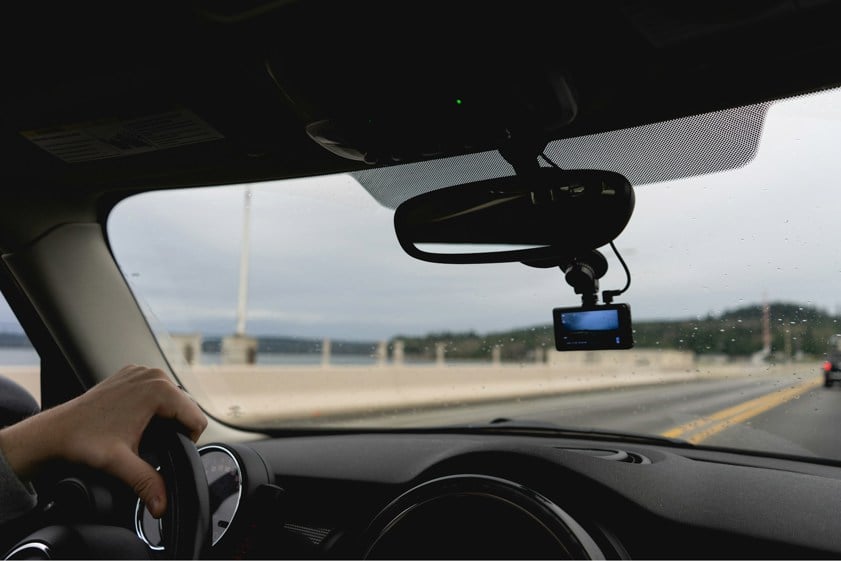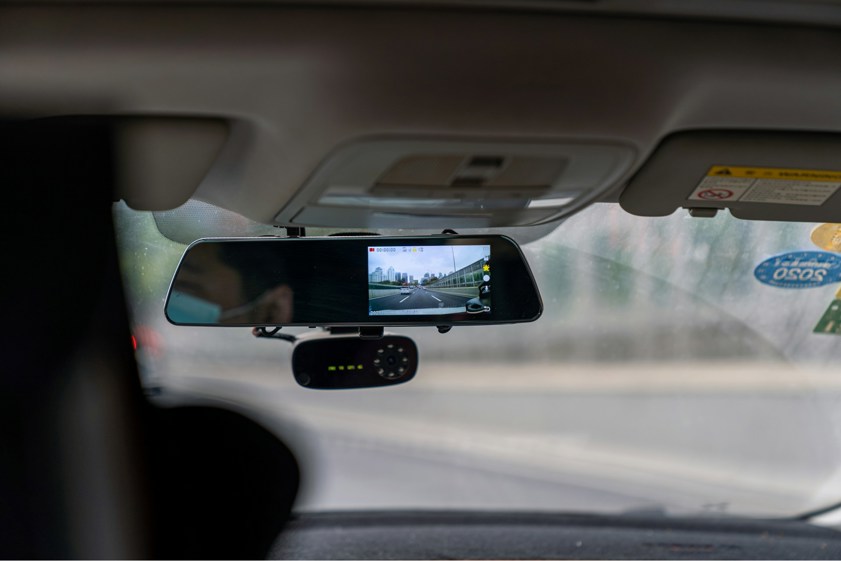
If you’ve ever crossed paths with someone who has a dash cam in their car, I guarantee they’ve told you how good they are. They’re now an essential bit of kit for many drivers, proving to be a sensible investment to keep them protected on the road.
A dash cam is a small camera that continuously records the view through a vehicle’s front windscreen, offering an extra layer of security and an unbiased eyewitness in the event of an accident.
However, if you’ve never used a dash cam before, it can be a tricky concept to wrap your head around. Are they really worth it, and what about if you drive a lease car?
In this blog, we’ll dive into the world of dash cams to reveal how they work, their pros and cons, and the insurance implications. We talk about:
A dash cam is a small camera that records the road ahead (and sometimes behind) as you drive. They provide an extra layer of security for drivers, being very useful in the event of an accident and for deterring thieves.
Modern dash cams come packed with technology such as high-definition recording, wide-angle lenses, and even night vision! Think of it as having a quiet, unbiased witness in your car at all times, ready to provide hard evidence for anything unexpected.
Dash cams are a relatively simple technology. Once fitted, they get to work quietly in the background without any fuss.
Most models draw power from your vehicle, musically via the 12V socket (cigarette lighter), or in some cases, your car’s fuse box. Once connected, they turn on when you start the engine and automatically begin recording the road ahead.
Many modern dash cams also offer cloud storage features, meaning important footage can be uploaded instantly and kept safe, even if your vehicle is damaged or stolen.
If you’re keen on protecting your vehicle when it's parked, certain dash cams also remain active when the engine is turned off. These will rely on an always-on port. However, it’s important to use this carefully as running it 24/7 can drain your battery.
“A dash cam can't prevent an accident, but it can make all the difference in what happens next. ”


If you need to go back through your footage, most dash cams have a removable SD card that can be plugged into your computer. From here, you can copy the footage to your computer and do whatever you please.
If you’ve gone for a more advanced camera, things can get even easier. Many newer models connect to your smartphone or tablet via Wi-Fi or Bluetooth. This means you can quickly review, download, and share videos from your device, perfect if you need to send footage to your insurer.
The price of a dash cam depends on how advanced you want it. For a basic camera, you’ll look at anywhere between £30 and £100. These models will typically record the view in a lower resolution, usually around 1080p, and won’t come with Bluetooth or cloud connectivity.
Here’s one we’d recommend from Halfords. It includes a 720p resolution, a 120-degree viewing angle, and an intelligent parking mode. It doesn’t include an SD card.
If you want a dash cam with advanced features, prices can range from £100 to £500. At this price, you’ll get features such as GPS, Wi-Fi and Bluetooth connectivity, and voice command and control.
Here’s an advanced dash cam on Halfords. It features a 4K resolution, an extreme weather mode, a three-inch touchscreen panel, night time recording, and a 140-degree wide viewing angle.

If you are thinking about getting a dash cam, here’s what you need to consider:
Pros:
- Evidence in the event of an accident - The main reason most people get a dash cam is to provide evidence if the car is involved in an accident. The recordings are solid evidence that can be provided to your insurance company when making a claim. If you’re not at fault, this could speed up the process and save you money on repairs.
- Encourage safer driving - Dash cams can help encourage those behind the wheel to always drive safely, legally, and with due consideration. If they are not, footage recorded by a dashcam can be used as evidence.
- Reduce insurance premiums - Some insurers will offer reduced premiums if you have a dash cam on your car. According to Uswitch, some providers give a discount of up to 20% if you use a dash cam.
- Memories - One thing that always gets forgotten with a dashcam is that it captures everywhere you’ve been. Suppose you’ve been on a memorable road trip with your family or want to see that fantastic sunset again; your dash cam will have it. Just make sure you were abiding by the laws of the road at the time…
- Security - With some dash cams recording while the car is turned off, their presence can help deter criminals looking to break into your car. You can also access them remotely and from the privacy of your home, meaning you have the opportunity to catch a criminal in the act.
Pro tip: Dash cams are great for leasing. They help clarify who's at fault and reduce the risk of unexpected charges.
Cons:
- It may be illegal - In some countries, like Austria and Portugal, having a dash cam fitted to your car is illegal. Failure to comply can result in fines or, in some extreme cases, a prison sentence.
- Privacy - Personal privacy is a trending topic at the minute, and dashcams are included in this conversation. Complications arise regarding other driver’s privacy and the fact that dash cams are an invasion of this.
- Expensive - If you’re looking for a good dash cam, it can set you back upwards of £100. Some people might not be able to afford it.
- Distraction - In some cases, dash cams can be a distraction for the driver. If the camera obstructs your view of the road, you could get a £200 fine and six points on your license. According to the Highway Code, you must ensure the dash cam doesn’t block your view.
- Encourage theft - I know I am completely against a previous point, but sometimes, a dash cam might encourage robbers. If you park in a poorly lit area, having an expensive camera on display in your car could encourage a robber to act.
Pro tip: Be mindful of installation rules in leased cars. Before installing a dash cam, always ring your finance provider and ask for permission.
Dash cams provide hard evidence of when you’re on the road. This can positively impact your insurance policy, but not always in the way you might expect.
Potential benefits:
- Some insurers offer discounts for having a dash cam installed. However, this isn’t a standard offering, so it’s worth double-checking.
- Protecting your no-claims discount - Dash cams can provide evidence that you were not at fault for an accident, rather than a 50/50 decision.
- Speed up the claims process - Having dash cam footage can help settle a claim much faster.
Potential downsides:
- The footage needs to be clear and up to the standards of insurers. If not, it won’t be used.
- If the footage shows you were at fault, it could be used against you.
If you have a lease car, you can usually install a dash cam. However, it’s worth double-checking with your finance provider first as they are the legal owner of the vehicle.
You’ll also need to consider that no permanent modifications are allowed to a lease car, so hardwiring a dash cam might not be allowed.
Pro tip: Always check your lease agreement or speak to your broker/finance provider before installing a dash cam.
In most cases, yes. The pros often outweigh the cons, especially when it comes to peace of mind.
For lease customers in particular, dash cams offer an extra layer of protection against disputed, fraudulent claims and unexpected accidents.
Combine this with regular maintenance and careful driving, and you’ll not only enjoy your lease to the fullest, you’ll return it without any surprises.
Want to protect your lease car and drive with confidence? Explore our vehicle maintenance tips and keep your car — and dash cam — in top condition today.
Originally posted: 14th March 2024
Last updated: 6th May 2025
Due to be reviewed: 6th May 2025

